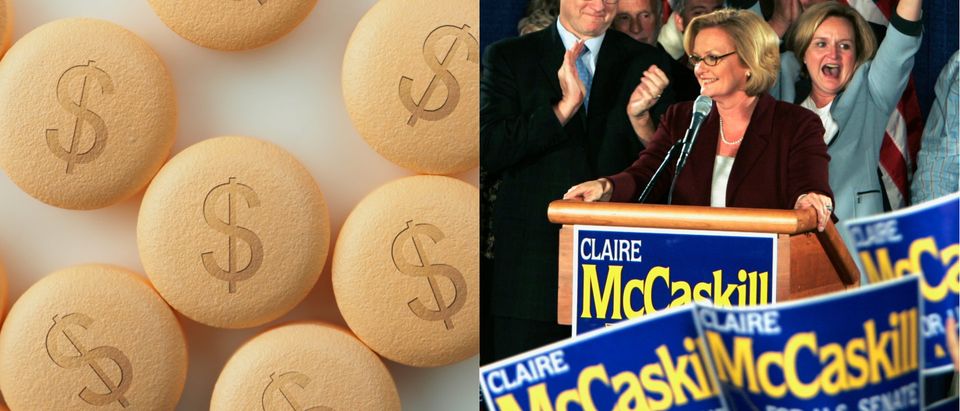On Monday, the Treasury Department and IRS announced they will no longer require most nonprofits to submit donor information as part of their tax returns.
This move shouldn’t have been necessary considering this information is already supposed to remain private. Recent history, however, provides several troubling cases in which government officials threatened to expose unfavored donors to public scrutiny and shut down the free speech they sought to fund.
But rogue bureaucrats aren’t the only ones to fear. Witness Missouri Sen. Claire McCaskill’s recently introduced “transparency” legislation that would strip away these privacy protections and require drug manufacturers to report their payments to patient-and-disease-specific advocate and education groups.
In 2017, nearly $100 million was spent lobbying by the Pharmaceutical Research and Manufacturers of America, Blue Cross Blue Shield, the American Hospital Association and the American Medical Association. These four entities represent the largest factions of our health care system: drugs, insurance, hospitals and doctors.
Yet McCaskill’s Patient Advocacy Transparency Act only targets drug manufacturers, who have become an almost cartoonish villain for the rising cost of health care.
McCaskill justifies singling outpatient advocacy organizations because — according to her recent report “Fueling an Epidemic” — they “may have played a significant role in creating the necessary conditions for the U.S. opioids epidemic.”
How? Because these organizations, irrespective of their funding sources, argue that patients in chronic pain should have responsible access to pain relief.
McCaskill’s bill, however, appears to be driven by more than just high-minded — if incorrect — rhetoric. Her two largest corporate donors are Centene and Express Scripts, both of which are among the country’s dominant health insurers and pharmacy benefits managers.
She has received nearly $600,000 from these two donors alone over the past decade or so — by far the largest recipient of their largesse. These interests would like nothing more than to hamstring drug companies’ efforts in the lobbying arms race.
If McCaskill were merely interested in transparency, she would advocate it for all parties, not just her disfavored industries.
Yet even such radical transparency is problematic in today’s contentious political climate, where it is far easier to discredit the messenger than engage the message. This means attacking a politician or a group’s credibility based on its financial support rather than its arguments or actions.
Funding transparency, in theory, is too often a cudgel in practice. Weaponizing it has become the norm and not the exception.
This is why the Constitution, backed by a series of Supreme Court rulings, holds that Freedom of Speech and Freedom of Association extend to the anonymous exercising of these rights.
Throughout American history, anonymity has been essential to encourage free speech, especially for dissenters. Consider the 1958 case NAACP vs. Alabama, where the state subpoenaed the group’s membership list partly because of its advocacy for black residents. The NAACP argued this was an attempt to scare away supporters, violating its freedom of speech and association.
The Court unanimously agreed, finding that disclosed members could be subject to “economic reprisal, loss of employment, threat of physical coercion, and other manifestations of public hostility.”
Anonymity, the decision continued, “may in many circumstances be indispensable to preservation of freedom of association, particularly where a group espouses dissident beliefs” — a right that would be violated by “state scrutiny of…membership lists.”
In a similar 1995 Supreme Court case defending anonymous leafletting, Justice John Paul Stevens wrote for the majority:
“Under our Constitution, anonymous pamphleteering is not a pernicious, fraudulent practice, but an honorable tradition of advocacy and of dissent. Anonymity is a shield from the tyranny of the majority. It thus exemplifies the purpose behind the Bill of Rights, and of the First Amendment in particular: to protect unpopular individuals from retaliation — and their ideas from suppression — at the hand of an intolerant society.
The interest in having anonymous works enter the marketplace of ideas unquestionably outweighs any public interest in requiring disclosure.”
The only way to fix American health care is for a vibrant marketplace of proposals and viewpoints to exist unfettered and judged on merit. The Treasury and IRS reporting change fosters this. Sen. McCaskill’s election-year gambit of weaponizing transparency threatens it.
Terry Wilcox is the co-founder and executive director of Patients Rising, which voluntarily discloses that it receives partial funding from drug manufacturers.
The views and opinions expressed in this commentary are those of the author and do not reflect the official position of The Daily Caller.


